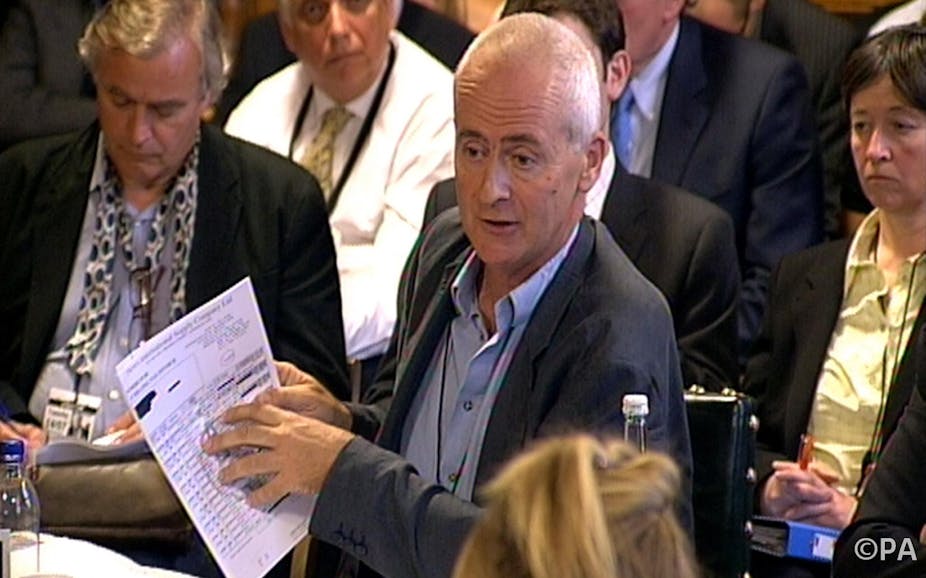Nick Davies is a hero for my generation of journalists and many generations of younger reporters. He can be fairly characterised as a Woodward or Bernstein of British “quality” journalism.
Davies decided to turn on his own tribe in recent years and has taken a lot of flak for it. Fortunately the vitriol has been metaphorical sticks and stones. Perhaps the worst he’s had to deal with is a sense that the “bad guys” hate him.
Flat Earth News, and now Hack Attack are blockbuster 400-page-plus denunciations of journalistic corruption, abuse of power, criminality and immorality.
Sources for Hack Attack include a large number of former News of the World journalists willing to help because of their shame and anger at what was going on.
It is written with novelistic characterisation and the language of a potential screenplay. He says of former managing editor Stuart Kuttner: “He had served half a dozen editors in a role like that of the Harvey Keitel character in Pulp Fiction – he cleaned up the mess.”
He talks of another senior editorial figure as somebody known as the “the rasping fuckwit” who was, he writes, “the kind of cynic who gives cynics a bad name”.
The News of the World is depicted as a cauldron of tabloid raptors. Davies unpacks the legend of this story with Vladimir Propp’s grasp of the Morphology of the Folk Tale and Aristotle’s Poetics.
Opening Pandora’s box
The story has all the elements of an unfolding Greek tragedy. He casts as his Watergate Deep Throat equivalent a man called “Mr Apollo”. This is code for the source holding the key to Pandora’s box. Open the box and the true extent of Glenn Mulcaire’s phone hacking targeting thousands over many years would burst open.
The person or persons leaking here could well have been breaking the law. Davies received documents at the heart of a confidentially settled breach of privacy action brought against News International by the chief executive of the Professional Footballers Association, Gordon Taylor.
The damages and legal costs deal of nearly £750,000 have been described as News of the World hush money.

Hack Attack is also a narrative of struggle. The Guardian’s assertion that News of the World phone hacking was rife was trashed and ignored by rival papers, the Metropolitan Police and Press Complaints Commission.
Davies says the Guardian’s editor since 1995, Alan Rusbridger, is a man of backbone who stood by him in the eye of a storm of derision and castigation.
Rusbridger’s befuddled Erik Satie of Hampstead appearance is beguiling. He has been mocked as an aging Harry Potter adult look-alike and lapsed amateur pianist. But his appearances before Leveson and House of Commons select committees have been steely.

The book and its associated promotion do provide some clues as to why Davies and the Guardian may indeed be “hated” not necessarily by just “the bad guys” of tabloid land.
The book seeks to rationalise the wretched damage, destruction and mess ignited by the scandal. Davies is defensive and sanitising about the blood libel that News of the World hacks had deleted Milly Dowler’s messages giving false hope to her parents that she was still alive.
It is argued this was “an honest mistake” and that any examination of media coverage at the time shows it is the phone hacking of a murdered teenager’s phone that focused public outrage.
Davies says he and the Guardian were not responsible for the loss of hundreds of jobs through the News of the World’s closure. This was a cynical move by Murdoch to bring forward a plan for the Sunday Sun and offer up a sacrificial lamb to save the bid for BSkyB.
Political agenda
I suspect the ambiguity and paradox of deserved admiration and undeserved loathing derive from his political agenda.
There is a very strange ranting epilogue against neo-liberalism at the end. Speaking as an orthodox broadcast journalist who believes politics and attitudes need to be locked at home, I find Davies editorialises as much as he reports. He comes across as the veritable Oliver Cromwell of media ethics reform. He put his name, along with John Pilger, to the demand from “200 leading cultural figures” for the press to surrender to Royal Charter approved regulation.
He aims to eradicate cruel tabloid journalism that ruins people’s lives yet the unintended irony is that Davies’ greatest story has led to the ruin of many journalists’ lives, their sources and police media relations. The families of journalists and sources going to jail may not appreciate the tone of his speech at Hack Attack’s book launch.
This is the story that not only led to the Leveson Inquiry, criticised by some as a political show-trial, but panicked News International into handing over computer hard-disks that may turn out to be the most catastrophic betrayal of reporters’ sources in journalism history.
No other country in the western world has been criminally investigating and prosecuting so many journalists. An industry shedding circulation, titles and jobs has lost up to £1 billion compensating privacy claimants and paying lawyers’ fees.
Article 10 of the Human Rights Act states that freedom to hold opinions and to receive and impart information and ideas must exist without interference by public authority. Existing criminal and civil law already cover the necessary exceptions. This is something the News of the World’s former chief reporter and newly released jailbird Neville Thurlbeck explained with some insight at the Oxford Union prior to his Old Bailey sentencing.
Davies was indeed only the messenger who sowed the wind – and, as such, he should not be held responsible for reaping the whirlwind that has devastated some tabloid careers. But if there are people out there – other than what he calls “the bad guys” who regard him as a traitor to journalism, it may have more to do with his support for a form of press regulation which I and many others think may devastate the craft as a whole.

